 The Ethanol Promotion and Information Council (EPIC) has a new executive director. She is Toni Nuernberg, who comes to EPIC from ACA International in Minneapolis where she worked for 29 years, the last 12 as chief operating officer of ACA International Holding Company Inc. and its for-profit subsidiaries.
The Ethanol Promotion and Information Council (EPIC) has a new executive director. She is Toni Nuernberg, who comes to EPIC from ACA International in Minneapolis where she worked for 29 years, the last 12 as chief operating officer of ACA International Holding Company Inc. and its for-profit subsidiaries.
 Nuernberg says when she decided to make a career move she was looking for an exciting new industry with lots of potential.
Nuernberg says when she decided to make a career move she was looking for an exciting new industry with lots of potential.
“Clearly the ethanol industry is that and so much more,” she says. “The thing that struck me about it was that every person that I talked with about this position from the CEOs of the member organizations to the staff was their passion and the excitement that they feel about this industry.”
This edition of “Fill up, Feel Good” is all about Toni. Find out about her background, her goals and ideas for moving EPIC and the ethanol industry to a new level.
The podcast is available to download by subscription (see our sidebar link) or you can listen to it by clicking here (6:00 MP3 File):
[audio:http://www.podtrac.com/pts/redirect.mp3?http://www.zimmcomm.biz/epic/epic-podcast-2-4-08.mp3]
The Fill Up, Feel Good theme music is “Tribute to Joe Satriani” by Alan Renkl, thanks to the Podsafe Music Network.
“Fill up, Feel Good” is sponsored by the Ethanol Promotion and Information Council.


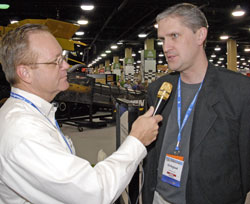 Ed Hegland is a farmer from Minnesota and currently serving as Chairman of the
Ed Hegland is a farmer from Minnesota and currently serving as Chairman of the 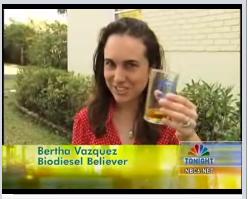
 I couldn’t resist this story when I ran across it.
I couldn’t resist this story when I ran across it. The National Biodiesel Board is looking for people to serve on its new Sustainability Task Force. You might remember from
The National Biodiesel Board is looking for people to serve on its new Sustainability Task Force. You might remember from 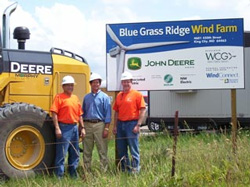
 “On behalf of the EPIC board and staff we are excited to have Toni as the new executive director,” said Tom Branhan, EPIC Board President and CEO and President of Glacial Lakes Energy. “Toni is joining a very strong team and will be taking EPIC to new heights as the industry rapidly advances.”
“On behalf of the EPIC board and staff we are excited to have Toni as the new executive director,” said Tom Branhan, EPIC Board President and CEO and President of Glacial Lakes Energy. “Toni is joining a very strong team and will be taking EPIC to new heights as the industry rapidly advances.” According to year-end figures released by the Energy Information Administration, U.S. ethanol production averaged 423,000 barrels per day, totaling 6.48 billion gallons for the year. That is an increase of 108,000 barrels per day over 2006.
According to year-end figures released by the Energy Information Administration, U.S. ethanol production averaged 423,000 barrels per day, totaling 6.48 billion gallons for the year. That is an increase of 108,000 barrels per day over 2006.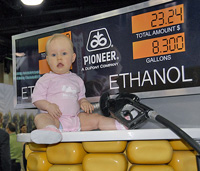 There were lots of babies at the
There were lots of babies at the 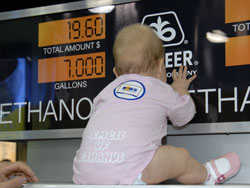 The E85 sticker on her shoulder was supplied by the
The E85 sticker on her shoulder was supplied by the 
 The policy was officially introduced at the end of January and Deere has been talking with growers at events during the last month, including the
The policy was officially introduced at the end of January and Deere has been talking with growers at events during the last month, including the 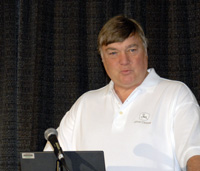 Very simply, the policy insures yield shortfalls below contracted volumes in the event the price to replace the corn rises above the federal crop insurance coverage. The policy is being offered in Iowa, Illinois, Indiana, Kansas, Minnesota, Missouri, Nebraska, Ohio, South Dakota, and Wisconsin. “We offered it where the majority of the active ethanol plants are in existence today,” Daggett says.
Very simply, the policy insures yield shortfalls below contracted volumes in the event the price to replace the corn rises above the federal crop insurance coverage. The policy is being offered in Iowa, Illinois, Indiana, Kansas, Minnesota, Missouri, Nebraska, Ohio, South Dakota, and Wisconsin. “We offered it where the majority of the active ethanol plants are in existence today,” Daggett says. 
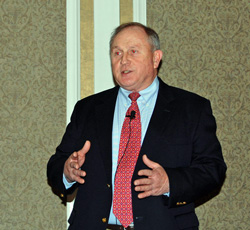 He says there are two critical issues – making sure we increase the number of E85 pumps nationwide and increasing the number of flex-fuel vehicles on the road. “If we get those two things done, we ought to be able to keep up fairly well with the supply,” he said.
He says there are two critical issues – making sure we increase the number of E85 pumps nationwide and increasing the number of flex-fuel vehicles on the road. “If we get those two things done, we ought to be able to keep up fairly well with the supply,” he said.